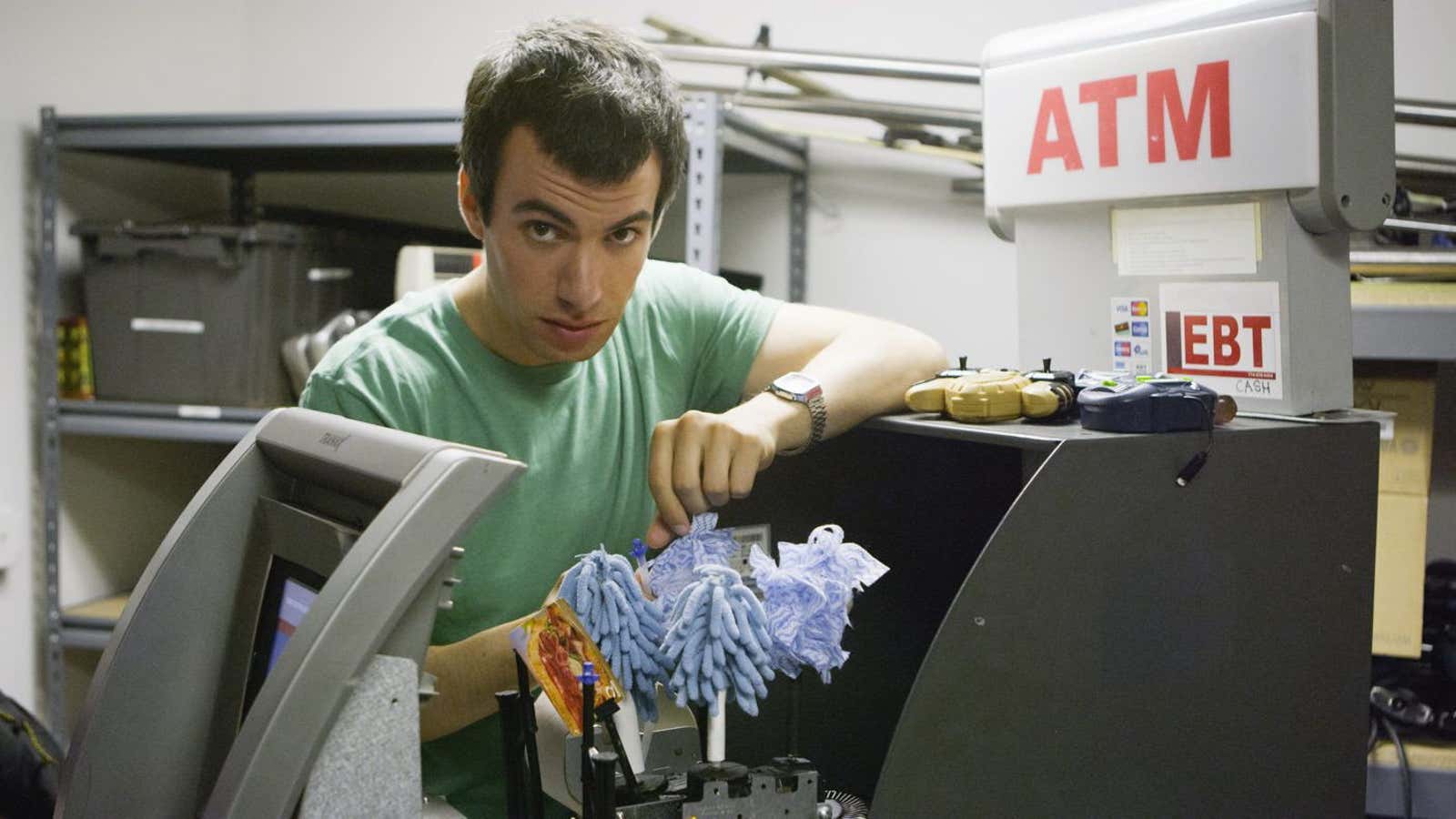In the season three finale of the comedy-reality show Nathan for You—which returns to Comedy Central for its fourth season on September 28th in the US—host and creator Nathan Fielder impersonated Corey Calderwood, a part-time arcade worker, wearing a bodysuit and 3D-modeled mask of Calderwood’s face. Then he pulled off an incredibly bombastic stunt to turn the self-described “nobody” into a local hero.
After hiding Calderwood away in a trailer, Fielder revealed his secret seven-month-long process of learning to walk a high wire, and then donned a bodysuit and disguised himself as Calderwood. The episode culminated in Fielder performing a terrifying tightrope walk between buildings in view of a cheering crowd—elevating Calderwood to a local hero.
The stunt was risky, impressive, and utterly bizarre. It left viewers moved, but also off-balance. With his off-kilter version of a reality show, Fielder goes beyond the cringe comedy of Curb Your Enthusiasm. Fielder—who revels in his own social awkwardness—plays on viewers’ empathy and aspirations, at once urging us to root for the underdog and mocking the ease with which the media, crowds, and fame-hungry individuals can be manipulated.
The true brilliance of Nathan for You is in its ability to glean humor and awe from kindness, as well as anxiety. Fielder presents himself as a kind of bizarro-world business consultant—with schemes such as purposefully making it easier to break merchandise in an antique store with a “You break it, you buy it” policy, upping the scariness of a haunted house by making visitors believe they caught an airborne disease, and exploiting a legal loophole to allow a liquor store to sell alcohol to minors. The strangers that Fielder encounters are too kind to outright tell him his ideas are bad, and they half-heartedly go along with his schemes. And Fielder’s own obsessive commitment to his outlandish plans often elicits as much respect and wonder as it does scorn and laughter.
In Fielder’s most infamous stunt yet, he created a coffee shop called Dumb Starbucks, to compete against the real Starbucks. He argued that the stunt—in which he handed out coffee for free—was protected as parody, and he managed to drive a news cycle and spur customer lines around the block for days.
The show’s thematic and logistical ambitions have been noticeably growing in scale season-to-season. Nathan for You returns tonight with a special hour-long episode before officially starting its fourth season next week. From what’s hinted in the season four trailer, we can expect more of Fielder’s outlandish physical stunts, his usual disregard and disruption of legal systems and cultural norms, and what appears to be a taxi cab war waged on tech giant Uber.
Given the collective psyche of Americans in a shifting political climate and an increasingly antagonist attitude toward the power of Silicon Valley, it will be interesting to see how Nathan for You directs its long-standing battle against authority and institutions.
“What won’t people do?” is the central question of Nathan for You. It’s a question that traditional reality shows are also preoccupied with, but Fielder uses it to identify and satirize the uncomfortable, anxious behaviors that increasingly dominate our frazzled lives.
Another running theme throughout Nathan for You is Fielder’s own social anxiety, conveyed via his deadpan delivery and difficulty connecting with people. These qualities have been played for humor, but also for pathos. The “reality” of Nathan for You—populated by struggling, aspirational people—is arguably more real than that of the scripted, cynically casted shows that dominate the genre.
And it’s in this real world, provoking real reactions from real people, that Fielder has mastered his innovative, uncomfortable brand of humor.
